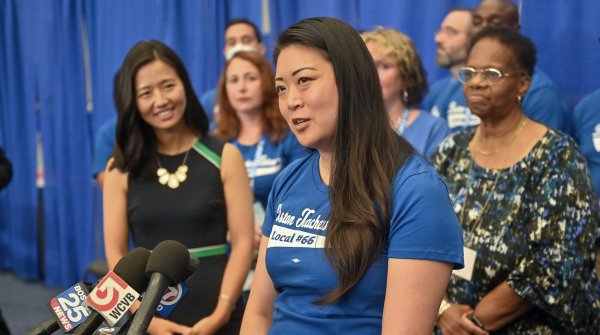July 20, 2022

Jessica Tang, head of the Boston Teachers Union, speaks at a national teachers convention in South Boston as part of an announcement of an agreement between the city and the union. Mayor Michelle Wu (left) and Jeri Robinson, chair of the School Committee (right), are behind her. Image via Jeremiah Robinson/Mayor’s Office
Eleven months after the expiration of the contract between the Boston Teachers Union and city officials, Mayor Michelle Wu and Jessica Tang, the union’s president, have announced a tentative accord. The announcement came at the American Federation of Teachers’ national convention in South Boston last Thursday (July 14).
Tang, the leader of the Dorchester-based union since 2017, credited the mayor’s office and Jeri Robinson, the head of the School Committee, with getting deeply involved in the negotiations that resulted in an agreement.
The agreement comes with a compounded 9.5 percent wage increase, in part due to a retroactive raise due to the lack of a contract for 11 months. It also seeks to revamp how the school district handles special education, with reductions in class sizes and reviewing needs of students with individualized education plans (IEPs) and who are English Language Learners.
The agreement also calls for funding new positions focused on additional support for IEP students and English Language Learners, and 12 weeks of paid parental leave for all education staff, regardless of seniority.
The school system had come under fire for its special education department, and state officials said it was in “systemic disarray.” Citing that and a host of other issues, the state’s education commissioner, Jeff Riley, threatened to take over the school district and declare it “underperforming.”
Both Wu and Tang opposed the takeover, and Wu late last month struck an agreement with Riley that calls for an auditor to look at the school system’s data, seeks changes to the special education department, and sends $10 million over three years from the state.
The school system also agreed to a 95 percent on-time rate for its buses, a new response system for safety issues, and an overhaul of its special education policies later this summer.
The threat of a state takeover had a “unifying impact” among the city and union officials negotiating the teachers’ contract, according to Tang. “It forced a lot more conversations with each other, and helped us to really focus in on the areas that we needed to work together to meet the shared interest of helping Boston Public Schools be at its best,” she said in an interview.
The state’s audit of the special education department validated concerns teachers had, according to Tang. “The district and the mayor and school committee knew this was a big issue that had to be fixed,” she said. “We spent hours and hours and hours trying to figure out how we create the conditions where these issues can be addressed. Obviously, there will be disagreements on the how but there was a lot of agreement on the what. That helped us get to the agreement on the how.”
At one point, Tang felt the two sides were not meeting enough, and the mayor and her aides stepped in, upping the number of counter proposals coming from the city. While negotiations started on Zoom, meetings in the last few months occurred in-person. The majority of them took place at BTU’s headquarters at 180 Mt. Vernon Street, given the logistics of a building with available parking, and enough room to spread out due to Covid concerns. There was at least one meeting at City Hall, and Wu stopped by that one, as well as at least one at the union hall.
Tang also credited Robinson, the School Committee chair, for personally attending multiple bargaining sessions. “That was important because oftentimes School Committee members and management don’t hear directly on the ground, in the schools,” Tang said. “This allowed for more meaningful conversations.” School Committee members, in her experience, typically don’t show up until the last several sessions.
Wu, who was elected in Nov. 2021, is also the first mother of BPS children to serve as mayor. “As a user of the system, she has a first-hand experience of seeing, I think, both sides,” Tang said. “She sees the administrative side and she is also able to experience the other side as a parent, receiving the impact of those policies and whether or not they’re working.”
The agreement is now expected to go before the union membership in September for ratification, and then will head to the School Committee for approval.


